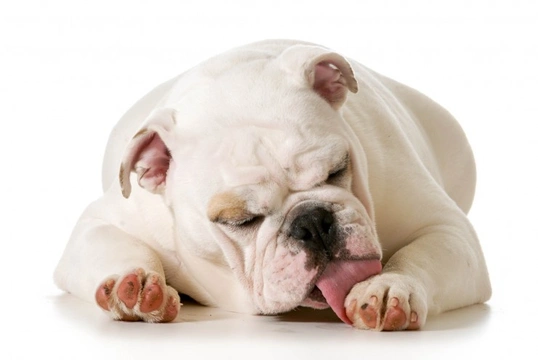
Why might your dog be licking their paws obsessively?
Dogs are animals that like to explore the world around them with their mouths, as you might have already observed from your dog’s propensity to try to lick you, or for some dogs, a preoccupation to hold a stick or toy in their mouths at all times! Dogs also spend a reasonable amount of time grooming themselves by means of licking, and while they are by no means as fastidious about this as cats are, you will nevertheless probably spot your dog licking themselves clean several times a day, and this is perfectly normal.
As part of this grooming, your dog may also lick their own paws, and sometimes appear to even be chewing between their toes, and again, this is a normal behaviour in itself assuming that the behaviour does not appear to be obsessive. However, if your dog is indeed licking, chewing or biting at their paws regularly or acutely, there may be a problem at the root of this that requires further investigation.
Read on to find out more about six canine problems that may manifest as a preoccupation with licking the paws.
Foreign bodies
If your dog has something trapped in the pads of their paws, between their toes or under the cuticle where the claw exits the paw, this is probably going to be both irritating and possibly sore, both of which can lead to obsessive-like behaviours in dogs in order to resolve them.
A small splinter that has worked its way into the pad of the paw or a grass seed trapped between the toes can all serve to annoy your dog and cause them to lick or chew at their feet to try to get some relief, and while this may do the job of dislodging the foreign body in question, it can also potentially worsen the problem and introduce bacteria into the sore or wound.
Check your dog’s feet over for anything that may be stuck in or on them, and if you cannot remove it yourself with ease or cannot find the problem at all, take your dog along to the vet.
A fungal infection
Athlete’s foot is a condition that people are generally familiar with, and this is a fungal condition that affects the toes, toenails and feet of humans. Dogs too can develop fungal infections on their paws, which can lead to itching and irritation of the feet, and can cause discolouration and changes to the texture of the pads of the paws too.
You will again need to speak to your vet to attain the right products to bath the feet with to kill the fungus, and also, get a topical antifungal cream to apply to the feet as well.
Arthritis
Arthritis leads to joint pain, and is apt to flare up on certain occasions and be relatively painless at others, and licking serves as a form of massage that can help your dog to reduce the pain. Older dogs in particular are more susceptible to arthritis, and this is worth speaking to your vet about, as a proper care protocol and pain management regime can help to keep your dog more comfortable.
Allergic conditions
Dogs can potentially be allergic to a whole range of different things, including pollen, certain food ingredients, and household cleaners. Allergies generally lead to a range of symptoms including topical itchiness, which may affect the whole body, or just certain areas of it.
If your dog’s feet are really itchy and driving them mad, they are apt to lick and bite at them to try to gain some relief. Some breeds of dogs including the Shih-Tzu and the English Bull terrier tend to be particularly allergy prone, so if you know that the breed of dog that you own is more prone to allergies than others, this should be one of the first things that you consider.
Flea bites
If your dog is infested with fleas, these tend to target certain areas of the body more than others, and one of these spots is the feet and lower limbs, where the blood vessels run close to the surface of the skin and provide an easy meal! Flea bites can be both sore and itchy for your dog, and if they have been bitten on their paws, licking may well tip you off to this, and a closer look should show clear evidence of a flea bite.
Eradicating fleas on your dog and in your home is the key to sorting this out!
Compulsive behaviours
As well as the various factors above that can lead to or contribute to your dog obsessively licking their feet, such an issue can also be a behavioural one, which may over time turn into a compulsion. Compulsive licking of the same area for a prolonged period of time can lead to sore, inflamed skin that will appear red and raw, and can even lead to more acute problems such as acral lick granulomas.
If you and your vet have ruled out a medical cause for obsessive licking, it is worth taking a closer look at your dog’s lifestyle, and things like their stress levels and boredom threshold to see if the issue is a behavioural one rather than a medical one.



